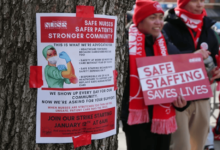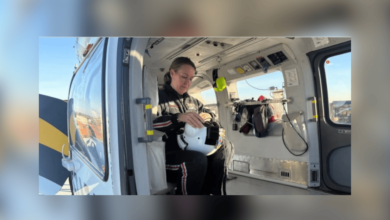New national approach to spotting deteriorating children

A new system for identifying when a child’s health is deteriorating is being rolled out across the NHS in England after being developed in collaboration with nurses.
The Paediatric Early Warning System (PEWS) introduces a single, national process for monitoring child patients and will replace any similar tools that are already being used in individual NHS trusts.
“This standardised method of tracking deterioration will improve working methods and safety”
Ruth May
The system assigns a score to a young patient that represents the level of concern about their condition and, as such, their risk of deterioration.
The score takes into account clinical markers such as blood pressure, heart rate, oxygen levels and levels of consciousness, but also places greater emphasis on parental concerns.
If a parent or carer raises a concern that their child’s health is worsening, this will immediately escalate the patient’s care regardless of other clinical observations.
The PEWS is mirrored on the National Early Warning System (NEWS) that already exists for adults.
However, unlike the NEWS, the paediatric version has four separate charts each covering a different age range, including newborn-11 months, one-four years, five-12 years, and those aged 13 and over.
NHS England has been developing the PEWS for over three years, working in partnership with the Royal College of Nursing and the Royal College of Paediatric and Child Health.
The system has been piloted across 15 sites and will be rolled out firstly in hospitals but will be expanded later to mental health, ambulance and community services.
It comes as the government has shown support for introducing Martha’s Rule – a new policy that would give patients, families and carers a right to request an independent review into their own or their loved one’s care if they felt their condition was deteriorating.
The policy has been fought for by Merope Mills whose daughter Martha died aged 13 at a London NHS hospital after signs of sepsis were not acted on quickly enough by doctors, despite the mother insisting something was wrong.
NHS England said any guidance from Martha’s Rule would be implemented into the PEWS.
Dame Ruth May, chief nursing officer for England, said PEWS ensured that escalation of care took place in response to medical observations as well as the voices of children and their families and carers.
“The national roll-out of PEWS is an important step in improving care for children and young people,” she added.
“This standardised method of tracking deterioration will improve working methods and safety, supporting doctors and nurses to do the very best for the children and young people in their care.”
Professor Simon Kenny, NHS national clinical director for children and young people, said the results of the pilot of PEWS had demonstrated “clear benefits for patients and staff alike”.
“This new process is the result of extensive work by NHS England, the Royal College of Paediatric Child Health and the Royal College of Nursing and will be invaluable for both NHS staff and patients, helping to create a ‘common language’ as part of the process in tracking any signs of deterioration and triggering escalation if needed,” he added.







